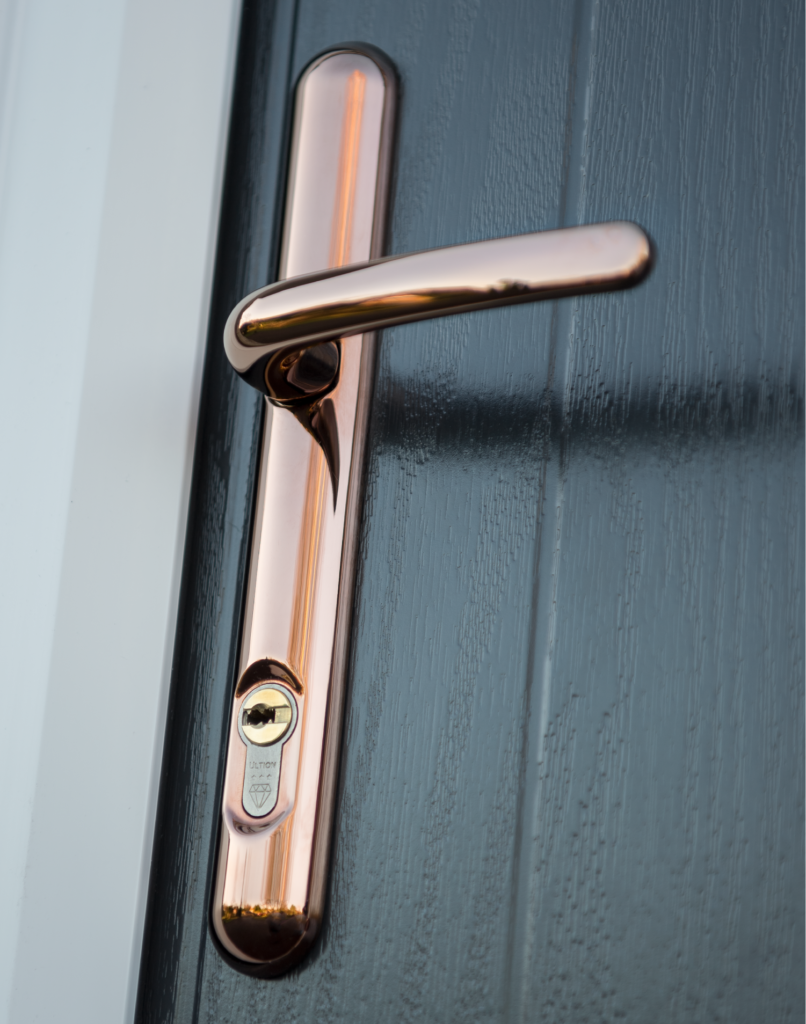Blog
Composite vs uPVC vs Timber: Which Is The Best Door For Security

When they say home is where the heart is, you envision a warm bed, a hot delicious meal, a good fire and laughs with your family. What binds this feeling of no place like home, is the sense of safety and security you have here.
The Importance of Front Doors for Home Security
When choosing your front door, there are many factors that need to be considered, including style, colour, durability, and most importantly security. You want your door to offer that welcoming tone to your visitors but also provide protection against intruders. Nowadays people are taking extra precautions to make sure their home is secure and protected against unwanted visitors. Outdoor cameras, lighting and extra locks are among the few options available, but having a strong, secure door is vital in adding that peace of mind for your family. With many options out there available, it’s hard to know if you’re making the right decision and which may offer the best security for your home.
There are two elements to consider when purchasing your perfect door, materials and most importantly, the locking system. Each will vary within each door type, with some seeming more promising than others. To make this decision a little easier for you, we have outlined the basics on Timber, UPVC and Composite doors!
Timber vs uPVC vs Composite: Which door is more secure?
Timber Door
Timber doors have been a popular favourite for a long time due to its aesthetically pleasing look, providing your home with that sense of character and traditional charm. Not only are they an attractive door choice but a sturdy and secure door option due to the materials used within. The material within timber doors has progressed to a solid, stronger hardwood, offering a more robust door solution, commonly measuring 44mm in thickness.
The locking system with timber doors typically include a yale or mortice lock, which is secure, however does not compare to newer, stronger locking systems. Multi-locking point systems are also available with timber doors, providing that added peace of mind. It is important that whichever locking system is used, it is correctly installed and checked, to prevent against intruder efforts.
It’s important to note that timber doors do require maintenance to ensure full security. Overtime the materials may be affected with general wear and tear and the impact of weather conditions. Therefore, regularly painting and priming your door can help ensure the security of its materials and increase its longevity.
uPVC Doors
uPVC doors are probably the most popular door choice due to their attractive modern style, low maintenance and appealing price tag. With the quality of uPVC doors ranging from poor to strong quality, you may need to check the standard before purchasing. UPVC doors are mainly made with plastic, but with an insulated steel frame, providing a sturdy door that is thermally efficient. Due to the steel core, uPVC doors are a great secure door that are extremely hard to break through.
Many older uPVC doors include a substandard cylinder lock, which is not the strongest locking solution among others, as it can easily be snapped. Due to the design of uPVC doors, they cannot support a lock fitted on the door anywhere except where it has been designed and pre-made to go. However, this is something that can be addressed upon purchase, and many uPVC doors now include ant-snap and multi-point locking systems.
Whilst uPVC doors are considered a secure door, they tend to have a shorter life span due to the deterioration of the materials, so you may have to consider changing your door after 10-15, as the security features will no longer be as efficient.
Composite Door
Composite doors are a popular door choice, similar to uPVC but with the guaranteed better quality and security. Composite doors are a modern advancement in doors, coming in a variety of styles and colours to suit any home, with low maintenance required and a long-life span guaranteed. The main difference between composite doors and uPVC doors is down to the materials used in both. Whilst uPVC doors are still great, the materials used within them tend to be plastic with a Styrofoam core, compared to composite doors that are made up of more unique and robust materials. At Apeer, our composite doors have a high-density polyurethane core, that is hard rock and tightly pressed together, providing a 70mm in thickness door. Ultimately this means your door is thicker, meaning it is harder for intruders to break through.
To add that extra bit of reassurance for you, composite doors are made with attractive security features such as state of the art locking systems. At Apeer, our composite doors are created to meet the police standard of security with Secured by Design, including PAS24. We incorporate a multi-point locking system, anti-pick and anti-snap cylinders.
Thinking of Getting A Composite Door for Your Home?
If you are unsure about the security of your door and are seeking alternative options, get in touch with us now and we would be happy to take you through our dooring options and what best will suit your home. We have a great variety of colours and styles, all coming with the highest security features!